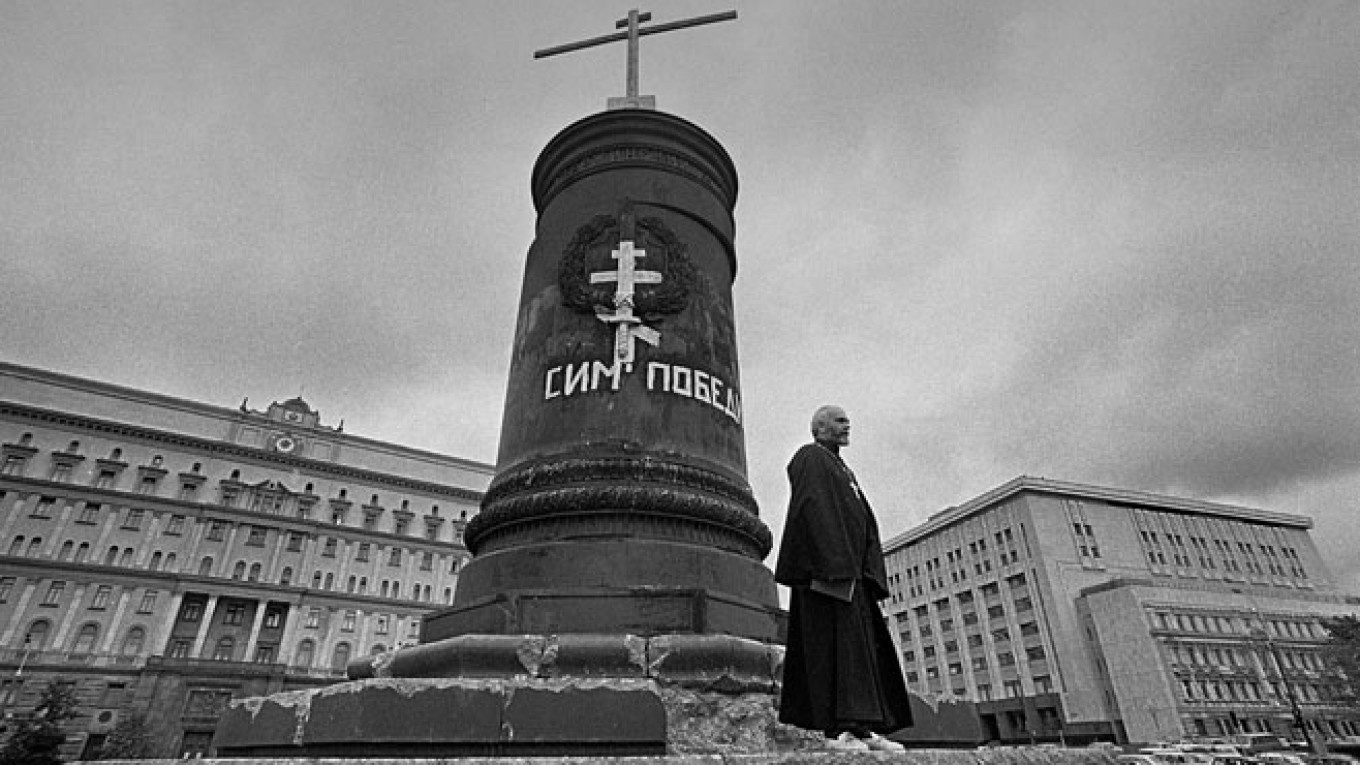On Aug. 22, 1991 at the peak of euphoria over the failure of the coup against Mikhail Gorbachev, the statue of Felix Dzerzhinsky, founder of the Soviet secret police, was pulled from its pedestal on Lubyanka Square. Since then, the square has remained empty as the public and authorities discuss — or rather argue — about who or what should be put in place of Iron Felix.
Lately the debates have been heating up, with a number of prominent political, historical and religious figures proposed for the pedestal. If you want to take part in the around-the-water-cooler discussions but don't know much about the candidates, here's a Lubyanka Square cheat sheet.
Felix Dzerzhinsky
Yes, that's right. One proposal is to bring Iron Felix back to the place he held on the square for so many years, surrounded by the buildings of the organization he founded. Another point in favor of his candidacy, according to supporters, is that he would once again face the Detsky Mir (Children's World) department store, a symbol of his care for orphans in the early years of the Soviet Union. As for the Red Terror and thousands killed — better not to ask at the water cooler.
? Andrei Sakharov
This candidate is the anti-Felix. The distinguished physicist, inventor of the hydrogen bomb, and the country's most prominent dissident, leader of the opposition to Soviet power, and a founder of the new Russian state might seem like a fine candidate for a major monument in a prominent location. But he's probably not the top choice of the boys in the buildings on the square.
Yevgeny Primakov
Prominent political figure and former Prime Minister, recently deceased. Best known for turning back his airplane en route to Washington when he received news of the start of NATO operations in Serbia in 1999. Pundits say this famous U-turn over the Atlantic became Moscow's "turn to a multi-vector foreign policy." In discussions with supporters, do not suggest this was just a habit of doing U-turns in Moscow traffic.
Pyotr Stolypin
Prime minister and minister of internal affairs under the last tsar, Stolypin was both a hardliner and a reformer, famous for getting the nation more or less under control after the first revolution of 1905-07. He is the only political figure whose element of dress has gone down in history, although not in a nice way: "Stolypin's necktie" referred to the executioner's noose. Supporters say he deserves a statue for his famous saying: You need upheavals, we need a great Russia.
Vladimir the Great
No, the other one: the 10th century Grand Prince of Kiev who was baptized into the faith and brought Christianity to his people. Proposed largely because the city government doesn't know what to do with the enormous statue of Vladimir they originally wanted to put on Vorobyovy Gory (Sparrow Hills). One problem: the 24-meter (80 feet) high statue might overpower the square. Second problem: The constitution says Russia is a secular state.
President Vladimir Putin
The other Vladimir the Great, certainly the most popular candidate with the Russian public. In favor of this candidate, supporters point out that he headed the Federal Security Service, so he'd be at home across from his old workplace. Only problem: Monuments of living people are not put up. So perhaps the square will remain empty for another couple of decades.
A Message from The Moscow Times:
Dear readers,
We are facing unprecedented challenges. Russia's Prosecutor General's Office has designated The Moscow Times as an "undesirable" organization, criminalizing our work and putting our staff at risk of prosecution. This follows our earlier unjust labeling as a "foreign agent."
These actions are direct attempts to silence independent journalism in Russia. The authorities claim our work "discredits the decisions of the Russian leadership." We see things differently: we strive to provide accurate, unbiased reporting on Russia.
We, the journalists of The Moscow Times, refuse to be silenced. But to continue our work, we need your help.
Your support, no matter how small, makes a world of difference. If you can, please support us monthly starting from just $2. It's quick to set up, and every contribution makes a significant impact.
By supporting The Moscow Times, you're defending open, independent journalism in the face of repression. Thank you for standing with us.
Remind me later.


